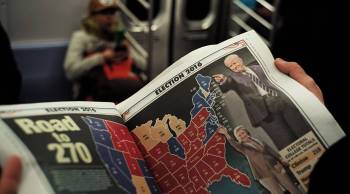
New China tariffs have arrived. How do voters feel about them?
New China tariffs have arrived. How do voters feel about them?

Tariff increases targeting imports from China were announced this week by President Joe Biden. They’re on things like electric vehicle batteries and computer chips, and the Biden administration says they’re more targeted than the Trump administration’s versions.
Meanwhile, there’s some new polling about how voters see tariffs. It’s monthly data from the Financial Times and the University of Michigan’s Ross School of Business. Erik Gordon is a professor there, and he spoke with “Marketplace Morning Report” host David Brancaccio for more. The following is an edited transcript of their conversation.
David Brancaccio: So, with this new data, how does it break down first starting with Republicans?
Erik Gordon: Yeah, the Republicans, oddly, are in favor of [tariffs]. They think it’s more important to protect U.S. business jobs, even if it means that it’s more expensive to import certain goods. They think that’s more important than keeping prices low.
Brancaccio: All right. As for Democrats, how does it break down?
Gordon: Democrats are not so gung-ho as the Republicans are. You know, 52% of Republicans are in favor of tariffs — only 41% of Democrats.
Brancaccio: That’s interesting, because — among other things — big business, corporate America, generally does not like tariffs, with some exceptions. But here we have people who might self-identify as conservatives being more open to the government having a bigger role in what things cost and what comes across the border at what price.
Gordon: Could be some rough and tumble with Republicans. Are we going to be conservatives when it comes to the economy and economic policy? Are we going to be populists? Who knows.
Brancaccio: And according to the poll that your school participated in with the FT, you also added the word “China” to the question. And how does that play out in the responses?
Gordon: If you add the word “China” — if you say “from a Chinese supplier” instead of “from a foreign supplier” — people are more in favor of tariffs. So we want to protect U.S. jobs against foreign imports, but more of us are worried about imports from China than from other countries.
Brancaccio: And a big thing that’s in dispute now with China imports are solar panels, which — if they’re cheaper, they can become more widespread and perhaps do a little bit more in the fight against climate change. But the Biden administration sees unfair competition if there are subsidies involved in making those solar panels cheap.
Gordon: Yeah, the economic issues for the politicians are really complicated. We’re pushing EVs. We’re pushing all kinds of things to save us from burning up the planet. But, you know, maybe not if the help comes from China.
There’s a lot happening in the world. Through it all, Marketplace is here for you.
You rely on Marketplace to break down the world’s events and tell you how it affects you in a fact-based, approachable way. We rely on your financial support to keep making that possible.
Your donation today powers the independent journalism that you rely on. For just $5/month, you can help sustain Marketplace so we can keep reporting on the things that matter to you.

















